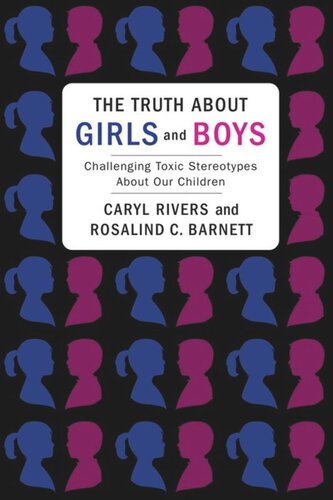

Most ebook files are in PDF format, so you can easily read them using various software such as Foxit Reader or directly on the Google Chrome browser.
Some ebook files are released by publishers in other formats such as .awz, .mobi, .epub, .fb2, etc. You may need to install specific software to read these formats on mobile/PC, such as Calibre.
Please read the tutorial at this link: https://ebookbell.com/faq
We offer FREE conversion to the popular formats you request; however, this may take some time. Therefore, right after payment, please email us, and we will try to provide the service as quickly as possible.
For some exceptional file formats or broken links (if any), please refrain from opening any disputes. Instead, email us first, and we will try to assist within a maximum of 6 hours.
EbookBell Team

4.7
96 reviewsCaryl Rivers and Rosalind C. Barnett unravel the pseudoscientific rationales for the popular argument that the learning styles, brain development, motivations, cognitive and spatial abilities, and "natural" inclinations of girls and boys are fundamentally different. While they recognize that girls and boys encounter different stimuli and experiences, they also show that encouraging children to venture outside their comfort zones can help them realize more multifaceted characters. Educating parents, teachers, and general readers in the true nature of the gender game, Rivers and Barnett enable future generations to transform—if not transcend—the parameters of sexual difference.
Caryl Rivers and Rosalind C. Barnett are widely acclaimed for their analyses of women, men, and society. In The Truth About Girls and Boys, they tackle a new, troubling trend in the theorizing of gender: that the learning styles, brain development, motivation, cognitive and spatial abilities, and "natural" inclinations of girls and boys are so fundamentally different, they require unique styles of parenting and education.
Ignoring the science that challenges these claims, those who promote such theories make millions while frightening parents and educators into enforcing old stereotypes and reviving unhealthy attitudes in the classroom. Rivers and Barnett unmake the pseudoscientific rationale for this argument, stressing the individuality of each child and the specialness of his or her talents and desires. They recognize that in our culture, girls and boys encounter different stimuli and experiences, yet encouraging children to venture outside their comfort zones helps them realize a multifaceted character. Educating parents, teachers, and general readers in the true nature of the gender game, Rivers and Barnett enable future generations to transform if not transcend the parameters of sexual difference.